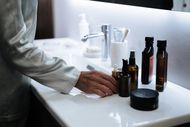Skincare routines involve spending time with yourself and taking care of your skin. After deciding what has to be incorporated into the routine, the next important component is deciding when you want to do it. Would you start with a morning skincare routine and a cup of coffee? Or would you prefer to keep it for the night before sleeping?
Apart from the timings, there are other differences between morning skincare and nighttime skincare regimens. We explore how they may suit different needs and products.
No skincare routine is perfect, just the one that works right for you. A limitless availability of skincare products in the market can be overwhelming. However, filtering it down in a regimen can feel relaxing and therapeutic.

Morning skincare routine vs Nighttime skincare routine: What works for you?

Finding the timing of your skincare routine can be based on multiple factors, such as your availability and mood. However, an important factor that also determines the routine's time, is the products' effectiveness at certain times. Let us explore the differences between morning and night skincare regimens:
1. Purpose of the skincare routine
Morning skincare regimens primarily focus on protecting from damage during the day, primarily from the sun and debris through the day. A morning routine may be especially important for someone who may spend time outside. Think of a morning skincare routine as a barrier that protects your skin throughout the day.
A nighttime skincare regimen is for restoration and rejuvenation. Like the effects of sleep, this routine allows your skin to recover from a rough and tough day. This routine helps to address targeted issues of the skin, such as acne.
2. Products used

It is recommended to opt for milder products in the morning that don't strip the skin. A 10-step Korean skincare regimen consisting of double cleansing, moisturizing, and SPF application is ideal for a morning routine. Opt for products that are lightweight and yet provide deep protection from external damage from UV rays, dust, and other substances. You can also add topical acne medications that get absorbed in the skin and ensure long-lasting results.
As for the nighttime ruoutine, your focus should be on products that aid hydration and repair the skin barrier. Add a face sheet in a week or two to decrease oil production. Avoid overusing any product at night. You can also consult a dermatologist to determine the products for your skin type.
3. Important considerations
For a morning skincare routine, sunscreen is the holy grail and should not be avoided. In the long run, it can help with anti-aging and protect skin from damage from UV rays.
For a nighttime skincare regimen, products with retinol can be helpful. At night, retinol works the best and boosts cell production. Additionally, it reduces the appearance of fine lines in the long run and is complementary to the natural restoration process.
Interestingly, skincare regimens also differ based on seasons. As you might expect, moisturizing might be necessary during winter to protect your skin from dryness.
On the other hand, incorporating sunscreen for oily and sensitive skin can become a must in summer. Deciding the time, season, and products for skincare can be helpful for your skin in the long run.
Are you a morning or night skincare person? Tell us in the comments.
